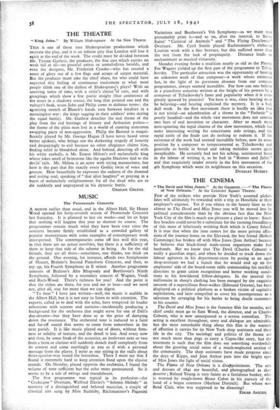THE CINEMA
46 The Devll and Miss Jones." At the Gauniont.--,, The Flame of New Orleans." At the Leicester Square Theatre.
FEW of the strikers who provide New York's assorted picket- lines will ultimately be rewarded with a trip to Honolulu at their employer's expense. Yet if you object to the luxury liner as the climax to The Devil and Miss Jones you will be moved less by political considerations than by the obvious fact that the New York City of the film is much too pleasant a place to leave: South Sea beaches could never be a substitute for the teeming friendliness of this mass of hilariously writhing flesh which is Coney Island. It is true that when the time comes for the more private affec- tions of the journey home on the Elevated, the boy friend (Robert Cummings) has broken off with Miss Jones (Jean Arthur) because be believes that black-listed trade-union organisers make bad husbands. But we know that The Devil (Charles Coburn) is really a guardian angel, and when he decided to track down the labour agitators in his department-store by posing as an aged shop-assistant we had a hunch that he would end up on the employees' side of the board-room table commanding his terrified directors to grant union recognition and better working condi- tions to his bewildered fellow-delegates. In the interval the millionaire in sheep's clothing has been enraged by the exquisite sarcasm of a supercilious floor-walker (Edmund Gwenn), has been displayed on a political platform as a broken victim of capitalist exploitation, and later compelled to cover his incompetence as a salesman by arranging for his butler to bring docile customers to his counter.
The Devil and Miss Tones is the funniest fihii for months, and chief credit must go to Sam Wood, the director, and to Charles Coburn, who is now unsurpassed as a screen comedian. The acting is excellent throughout, story and dialogue are admirable. but the most remarkable thing about this film is the wannth of affection it carries for its New York shop assistants and their life in the city. The sociology and politics of the theme are not much more than pegs to carry a Capra-like story, but the treatment is such that the film does say something worthwhile about the growing social sense of a much-neglected section of the community. The shop assistants have made progress since the days of Kipps, and Jean Arthur puts into the bright eyes of Miss Jones the light of social vision.
The Flame of New Orleans is a disappointment. The sets and dresses of 1841 are beautiful, and photographed as they deserve ; Roland Young is very funny as a fastidious banker, who is worsted by roughLhewn Bruce Cabot in his _ pursuit of the hand of a bogus countess (Marlene Dietrich). But where was Rene Clair, who was supposed to be directing?
EDGAR ARMY.

























 Previous page
Previous page